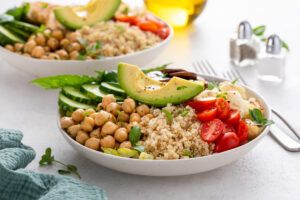
Hello fellow athletes and fitness enthusiasts!
Plant-based nutrition is gaining popularity among professional and collegiate athletes and fitness enthusiasts who want to boost performance and improve health. So, why are so many athletes turning to plants? It is a common myth that we need animal protein to sustain our physical activity. In fact, more and more research and athlete testimonies are showing that animal products can actually hold us back! The plant-based diet focuses on eating whole, plant-based foods like fruits, vegetables, beans, nuts, seeds, and grains, while cutting back on or avoiding animal products. I promise, you will want to keep reading.
What Is The Game Changers?
The Game Changers is a groundbreaking documentary that explores the profound benefits of plant-based nutrition, particularly for athletes seeking to optimize their performance, recovery, and overall health. Directed by Louie Psihoyos and produced by notable figures like James Cameron, Chris Paul, Louis Hamilton, Jackie Chan, and Arnold Schwarzenegger, the film follows James Wilks, a former UFC fighter, as he embarks on a journey to uncover the science behind plant-based eating. Through interviews with scientists, doctors, and world-class athletes, the documentary challenges common myths about protein and highlights how a plant-based diet can fuel strength, endurance, and recovery and take their athletic performances to a whole new level!
Why Choose Plant-Based?
One of the biggest benefits of a plant-based diet is its ability to reduce inflammation and help with recovery. Hard training can cause oxidative stress and inflammation, but plant foods are packed with antioxidants to combat these issues. Plus, plant-based proteins can meet your needs without the saturated fats and cholesterol found in animal products.
A plant-based diet also helps enhance cardiovascular function, which is critical for endurance athletes. Improved blood flow, thanks to the nitrate-rich content in vegetables like beets and leafy greens, can result in better oxygen delivery to muscles during workouts. This not only boosts performance but also shortens recovery times. Athletes who adopt a plant-based lifestyle often report increased energy levels and better digestion, both of which contribute to sustained training and competition.
Moreover, plant-based diets are naturally high in fiber, which supports gut health. A healthy gut microbiome has been linked to improved immune function and better nutrient absorption, ensuring that athletes can maximize their performance potential.
Backed by Science
Research supports many of the claims made in The Game Changers. 
The documentary showed a blood plasma test to demonstrate the effects of plant-based meals. This test revealed that a single plant-based meal reduced fat circulating in their blood plasma, improving blood flow, which can enhance oxygen delivery to muscles and boost athletic performance. After just one plant-based meal, their blood plasma was clearer, showing reduced fat content—a key factor in better circulation and recovery.
Studies show that plant-based diets can (Craig et al., 2009:
-
- Lower blood pressure (Whelton et al., 2018)
- Improve heart health (Satija et al., 2017)
- Help maintain a healthy weight (Turner-McGrievy et al., 2016)
- Enhance muscle efficiency by reducing inflammation (McCarty, 2004)
- Lower markers of oxidative stress, which helps athletes recover faster (Nieman, 2007)
- Again: Reduced fat circulating in blood plasma, improving blood flow, thus enhancing oxygen delivery to muscles, which boosts athletic performance

Recent studies also suggest that a plant-based diet may improve VO2 max (a measure of aerobic capacity) (Burke et al., 2019), making it particularly beneficial for endurance athletes. Additionally, by reducing the intake of animal-based foods, athletes can lower their risk of chronic diseases such as type 2 diabetes and certain cancers (McMacken & Shah, 2017), allowing them to maintain peak performance well into the future.
These benefits are not just theoretical—numerous elite athletes have demonstrated real-world performance improvements, showing how science translates into measurable gains in strength, stamina, and recovery.
What About Nutrients?

Some people worry that plant-based diets might lack nutrients like vitamin B12, iron, or omega-3s. While these require some extra attention, careful planning and supplements (if needed) can ensure you get everything your body needs. However, contrary to common belief, these nutrients can be met without supplements such as the testimony of several in this video. I myself have been able to maintain a healthy level of all labs values, including the B’s, iron, and omega-3s, through diet alone.
However, if you do desire SUPPLEMENTS, the only two brands that I recommend at this time are:

- COMPLEMENT : I really respect the extra effort this founder and team has put into making their supplements and products pure and clean with no dyes and fillers, supporting cruelty-free and vegan products that are backed by evidence-based science. Found at lovecomplement.com
- future kind + : The creators are brothers and nutritionists and they also recognized the importance of plant-based nutrition and focussed on evidence-based products, using 100% vegan ingredients, with science and environmental sustainability at the core. Found at furturekind.com
Featured Professional Athletes and Medical Doctors
The film features stories from world-class athletes like: 
- Scott Jurek (Ultramarathoner)
- Patrik Baboumian (Strongman)
- Dotsie Bausch (Olympic Cyclist)
- The Tennessee Titans (Professional Football Team, including Derrick Morgan, Wesley Woodyard, and Kendrick Lewis and 14 others)
- Morgan Mitchell (Australian Sprinter)
- Nate Diaz (UFC Fighter)
- The Miami Dolphins (Professional Football Players; including Griff Whalen, John Urschel, and Já’Wuan James)
- Kendrick Farris (Olympic Weightlifter)
- Rip Esselstyn (Former Professional Triathlete and Firefighter)

- Damien Mander (Former Australian Special Ops Military, Anti-Poaching Activist, and founder of Akashinga – formerly the International Anti-Poaching Foundation).
- James Wilks (Narrator of The Game Changers, and Former Professional Mixed Martial Artist)
- Collegiate Athletes, and others
These athletes prove that you don’t need meat to succeed at the highest levels. For example, Patrik Baboumian, one of the strongest men in the world, credits his strength and endurance to his plant-based diet. Similarly, the Tennessee Titans showcased how plant-based eating can benefit team performance, and UFC fighter Nate Diaz emphasizes endurance and recovery benefits.
Additionally, the documentary features prominent doctors, including:

- Dr. Dean Ornish, a pioneer in reversing heart disease through plant-based diets. Find him here and his books on Amazon.
- Dr. Caldwell Esselstyn, a former Cleveland Clinic surgeon and advocate for plant-based nutrition in preventing and reversing cardiovascular disease. Find him here and his books on Amazon.
- Dr. Neal Barnard, founder of the Physicians Committee for Responsible Medicine, specializing in chronic disease reversal through plant-based eating. Find him here and his numerous books on Amazon. (Born in FARGO, ND).
- Dr. Kim Allan Williams, a past president of the American College of Cardiology and supporter of plant-based diets for heart health. Find him here.
- Dr. James Loomis, a plant-based NFL physician who emphasizes its benefits for athletic performance. Find him here.
- Dr. Scott Stoll, co-founder of the Plantrician Project, advocating whole-food, plant-based diets for health and performance. After just one plant-based meal, their blood plasma was clearer, showing reduced fat content—a key factor in better circulation and recovery. Find him here and here and his books on Amazon.
The Game Changers 2 is Underway!

Thanks to LeBron James and Maverick Carter, a sequel is underway to further explore the depth and importance of plant-based nutrition. The sequel will explore how food choices not only affect personal performance and health, but also broader issues including children’s health, food justice, and the environment. Several of the original executive producers are expected to return for the second installment, which will feature an A-list cast of athletes and entertainers, who will confront challenging food-related subjects and present compelling stories from multiple continents.
The Big Picture
Switching to a plant-based diet isn’t just good for your health and athletic performance—it’s also better for the planet and animals. As more athletes embrace plant-based eating, they’re showing the world that you can thrive and excel without relying on animal products.
Are you ready to give plant-based nutrition a try? Whether you’re an elite athlete or just someone who loves to exercise, going plant-based could be a game-changer for you! I’m here to support you; reach out today.
Kind Regards,
Jami Streyle
RN, MS, HWNC-BC, HNB-BC, Nurse Coach
Jami@bodyofgraceliving.com
References
- Burke, L. M., Hawley, J. A., Wong, S. H., & Jeukendrup, A. E. (2019). Carbohydrates for training and competition. Journal of Sports Sciences, 37(7), 690-698. https://pubmed.ncbi.nlm.nih.gov/21660838/
- Craig, W. J., Mangels, A. R., & American Dietetic Association. (2009). Position of the American Dietetic Association: Vegetarian diets. Journal of the American Dietetic Association, 109(7), 1266-1282. https://www.jandonline.org/article/S0002-8223(09)00700-7/abstract
- McCarty, M. F. (2004). Vegan proteins may reduce risk of cancer, obesity, and cardiovascular disease by promoting increased glucagon activity. Medical Hypotheses, 63(5), 813-822. https://pubmed.ncbi.nlm.nih.gov/10687887/
- McMacken, M., & Shah, S. (2017). A plant-based diet for the prevention and treatment of type 2 diabetes. Journal of Geriatric Cardiology: JGC, 14(5), 342. https://pmc.ncbi.nlm.nih.gov/articles/PMC5466941/
- Nieman, D. C. (2007). Marathon training and immune function. Sports Medicine, 37(4-5), 412-415. https://doi.org/10.2165/00007256-200737040-00036
- Satija, A., Bhupathiraju, S. N., Rimm, E. B., Spiegelman, D., Chiuve, S. E., Borgi, L., … & Hu, F. B. (2017). Plant-based dietary patterns and incidence of type 2 diabetes in US men and women: results from three prospective cohort studies. PLOS Medicine, 13(6). https://doi.org/10.1371/journal.pmed.1002039
- Turner-McGrievy, G. M., Barnard, N. D., & Scialli, A. R. (2016). A two-year randomized weight loss trial comparing a vegan diet to a more moderate low-fat diet. Obesity, 15(9), 2276-2281. https://doi.org/10.1038/oby.2007.270
- Whelton, P. K., Carey, R. M., Aronow, W. S., Casey, D. E., Collins, K. J., Dennison Himmelfarb, C., … & Wright, J. T. (2018). 2017 ACC/AHA/AAPA/ABC/ACPM/AGS/APhA/ASPC/NMA/PCNA guideline for the prevention, detection, evaluation, and management of high blood pressure in adults. Hypertension, 71(6), e13-e115. https://doi.org/10.1161/HYP.0000000000000066
Share This Story
Stay Updated
Sign up to receive the latest news and tips from Body of Grace Living.






